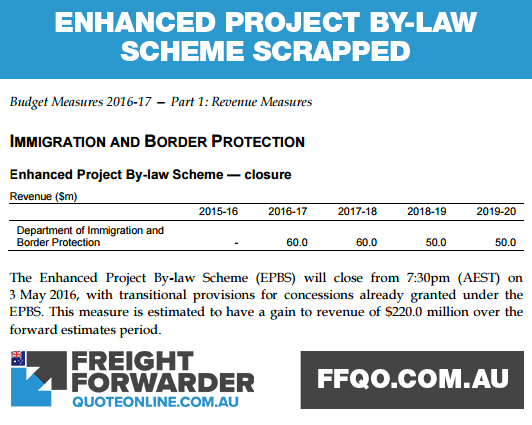Home » News »
Enhanced Project By-law Scheme (EPBS) scrapped
« Previous | Next »
The Enhanced Project By-law Scheme (EPBS) is now scrapped as announced upon the releasing of the Federal Budget 2016/17 last 3 May 2016, 7:30PM.

EPBS closure date announced upon the releasing of Budget 2016/17
Based on the Budget Paper released, the projected savings from the closure of EPBS ranges from $50 to $60 million per year, which means that an additional $1.1 billion of imports will be subjected to duty. This measure is estimated to have a gain to revenue of $220.0 million over the forward estimates period.
- What is EPBS?
- What are the reasons why the Government closed EPBS?
- What would be its impact to importers and exporters?
About EPBS
The EPBS is a government incentive scheme managed by AusIndustry, a specialist program delivery division within the Department of Innovation, Industry, Science and Research. This aims to provide duty free entry for goods associated with certain large capital projects.
Those projects should be under the following industries:
- Agriculture
- Food packaging
- Food processing
- Gas supply
- Mining
- Manufacturing
- Power supply
- Resource Processing
- Water supply
This scheme endeavours to upgrade the operations of those industries that require significant capital expenditure. It enables the cost of industrial projects to be reduced to world price levels, through the omission of customs duties on goods required to be imported for use in those projects.
It provides a mechanism in which proponents of major projects can access a full concession from customs duties. This happens if and only if the imported capital items for project development does not have a local producer. This improves the engagement process between proponents and local suppliers in a commercial context. In this way, the two core aspects of the scheme tightly align — they both centre on encouraging broader economic development.
Due to the benefits of EPBS, the scheme became popular in places where Tariff Concession Orders (TCO) was being limitedly applied.
Objective of EPBS
The Enhanced Project By-law Scheme has four objectives namely:
- Encouraging and enhancing investment in the establishment of world class operations
- Encouraging the involvement of Australian industry in supplying goods and services
- Reducing input costs for industry where there are sound reasons for doing so
- Facilitating Australian industry participation in domestic and international supply chains
Australian Industry Participation (AIP) policies and programmes encourage full, fair and reasonable opportunity for Australian industry to compete for work in major public and private projects in Australia.
EPBS qualification guidelines
While EPBS offers some significant advantages both commercially and strategically, not all projects within the mentioned industries were able to use its benefit.
Under the EPBS guidelines, to qualify for this concession investment projects must have a total project expenditure on capital goods of $10 million or greater.
Eligible goods are essentially capital equipment purchased for the project, such as:
Functional units
This includes one or more pieces of machinery, equipment or their components that are integrally connected to perform a discrete function such as:
- Blending
- Compressing
- Cooling
- Crushing
- Cutting
- Extracting
- Extruding
- Filtering
- Heating
- Moulding
- Welding
Procurement or equipment packages
These are quantity or a package of the same type of machinery, equipment and their components which is used across a project. This includes:
- Compressors
- Electrical equipment
- Mining Machinery
- Off-highway dump trucks
- Pumps
- Tanks
- Valves
Conveyors
By its nature, these are:
- Flexible flow lines
- Pipelines
- Pipes
- Power transmission lines
- And the like which is used to convey gas, liquids, minerals or other things.
Stainless steel materials
These are stainless steel materials which are directly incorporated into the goods identified above.
Only eligible goods that are not produced in Australia, or are technologically superior to those made in Australia, are eligible for a concession under the EPBS.
The government’s reason for scrapping EPBS
A number of reasons have been lined up why the Government closed EPBS. These include the declining of applications, reduction in tariffs and the availability of tariffs concession through the Tariff Concession System.
The recently signed Free Trade Agreements (FTA) with Korea, China, Japan and the countries in the Trans-Pacific Partnership also added the weight of making the scheme scrapped due to the benefits it evokes.
The benefits of free trade include:
- Better Australian access to important markets
- Improved competitive position for Australian exports
- More prospects for increased two-way investment, and
- Reduced import costs for Australian businesses and consumers alike
Aside from this, the Government forecasts that Trans-Pacific Partnership will result to annual reduction in duty of $60m once implemented.
Impact to importers and exporters
Due to the rise of FTA, the need for EPBS diminishes, as many goods imported with the assistance of the EPBS comes from the countries where Australia has free trade agreement with.
Since there are transitional provision given by the Government upon the closure of EPBS, this provides little effect for the projects which participated in the scheme. Participants with active AusIndustry Determinations can continue to use those determinations while they remain valid.
For assistance, call us at 1300651233 or send us a message.
Check out our other recent articles
Latest news
Read up on the latest Australian freight forwarding news and developments:
Marine cargo insurance, should you buy it? - 28 May 2023
Aus UK FTA 2023 highlights in of the new free trade agreement - 07 Apr 2023
Types of cargo shipped via sea freight - 05 Mar 2023

Get social with us
Check us out on Facebook. Get social and like our page. Feel free to post your thoughts - we will appreciate it.
Come see our clips on our YouTube channel and subscribe so you are notified when we add new ones.
To keep up to date with the industry and read up on industry trends and developments, follow us on LinkedIn.
For quick updates, follow us on Twitter.
1300651233